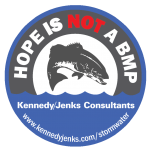This is the first of two blog posts on recent court rulings regarding stormwater
One of the greatest concerns of stormwater dischargers is the potential for third-party enforcement under the Clean Water Act (CWA). Most actions are brought about in federal court in order to take advantage of the CWA’s citizen suit provisions. Most threatened or actual litigation is brought by environmental advocacy groups, who have used the CWA as a vehicle to force permit holders to take action, where enforcement agencies have not. While the vast majority of threatened or actual suits are settled out of court, a few have been litigated and resulted in decisions by the courts. These decisions set precedent for future court cases and provide valuable guidance to permit holders on interpreting the permit.
In many cases, the courts have ruled in favor of the environmental groups and against the permit holders, resulting in most of the threatened lawsuits settling well in advance of full-blown litigation. Two recent citizen suits resulted in a summary judgment and the decisions are discussed here. These decisions have continued the trend of victories for environmental groups. While these decisions may cause concern to permit holders, they can also provide valuable lessons on how permit holders can achieve compliance.
Both of the federal court decisions presented here resulted from actions filed by Puget Soundkeeper Alliance (PSA), based in Seattle. PSA has been one of the most prolific litigators under the CWA in the U.S., bringing dozens of actions against stormwater permit holders each year. The background on each suit and the impact of the decisions to permit holders are presented below.
Puget Soundkeeper Alliance vs. Whitley Manufacturing Co.
PSA sued Whitley (PSA v Whitley), claiming that Whitley discharged industrial stormwater without a permit prior to Whitley obtaining a permit and receiving a conditional no exposure (CNE) status from the Washington Department of Ecology (Ecology). Whitley argued that PSA could not show that Whitley’s stormwater contained a pollutant, as defined in the CWA, and that Ecology’s CNE demonstrated that Whitley’s stormwater did not contain pollutants. The Court ruled contrary to Whitley’s argument, however, that PSA did not need to prove that Whitley’s stormwater contained a particular substance in a particular quantity. Congress, in enacting the CWA, determined that stormwater is, in and of itself, a pollutant. The CWA forbids the discharge of pollutants into navigable waters unless the discharge is allowed by permit.
Under the statutory scheme, the obligation to obtain an NPDES permit is triggered only where a pollutant is discharged from a point source. If a pollutant is not present, the EPA lacks the authority to require a permit. Even if the definition of “pollutant” is strictly and narrowly construed to include only those chemical constituents specifically listed (a theory that does not have universal acceptance), Congress was within its discretion to clarify that the phrase “industrial, municipal, and agricultural waste” includes stormwater (alone) that comes in contact with those materials.
Puget Soundkeeper Alliance vs. Cruise Terminals of America
PSA sued Cruise Terminals of America (CTA) (PSA v CTA) accusing that land-based cruise ship support activities represented industrial stormwater discharges requiring coverage under Washington’s Industrial Stormwater General Permit (ISGP). CTA operates the cruise ship terminal at the Port of Seattle and stormwater from land-based support operations are discharged to the Port’s municipal separate stormwater system and to the City of Seattle’s combined sewer system. In motions for summary judgement to determine how the case should proceed, CTA argued that land-based support activities were covered under its Vessel General Permit (VGP), which addresses incidental discharges associated with vessel operations, and/or under the Port of Seattle’s Phase I municipal stormwater permit.
The court found that land-based support activities are NOT covered under the VGP, and that the Port’s Phase I permit “may not be adequate” for stormwater discharges from industrial activities, such as vehicle maintenance, that are performed as part of the land-based support activities. However, the Court held that discharges to the combined sewer system are not considered discharges to “waters of the state” and do not require an ISGP. This latter finding appears to be in conflict with other federal, state, and local rules requiring discharges to a municipal treatment system (and then to surface water) to obtain a pretreatment permit. The Court also found that both CTA and the Port of Seattle exercise sufficient control over the cruise terminal to both be potentially liable for unpermitted discharges, regardless of who is the facility’s operator.
Lessons Learned
Citizen suits under the CWA are a continuing fact of life. While recent court decisions continue to favor the environmental advocacy groups, these rulings provide valuable guidance for permit holders in interpreting their permits. Permit holders should read their permits carefully, interpret the permit language with caution, and be diligent in implementing its requirements.
The Whitley decision makes it clear that stormwater itself is considered a pollutant. Stormwater associated with industrial activity must be discharged under a permit regardless of whether chemical contaminants are present or not. Environmental groups need not collect samples and show the presence of chemical constituents prior to suing. Obtaining a CNE does not protect permit holders from CWA liability.
The CTA decision makes it clear that a discharge of stormwater associated with industrial activities requires coverage under an industrial stormwater permit. In addition, property owners may have liability under the CWA for the activities of their tenants and/or operators.
Sign up
If you are interested in more information on Kennedy Jenks, don’t forget to subscribe to our blog!


